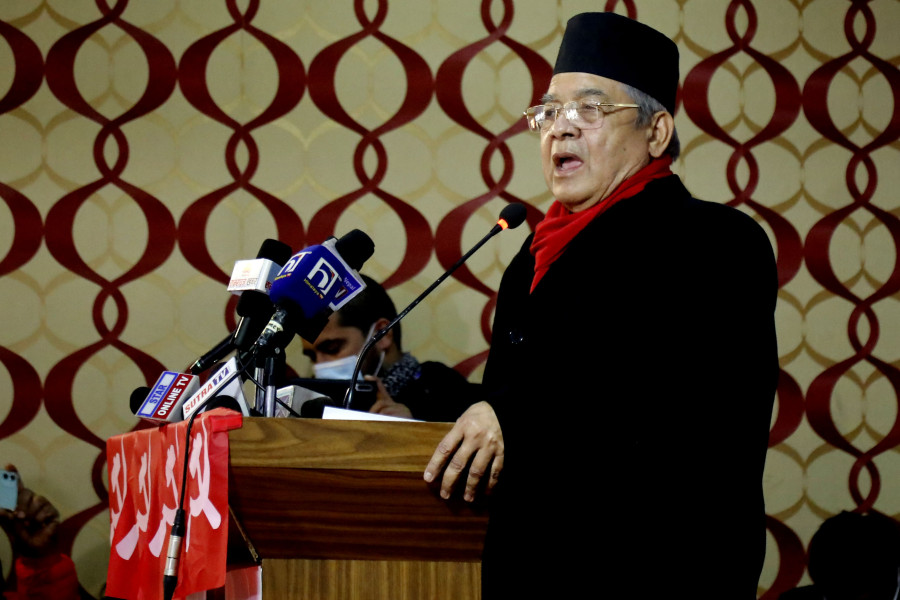Politics
Nepal Communist Party unification prospects slim, leaders and analysts say
Leaders from both factions continue to point finger at each other with elections just around the corner.
Anil Giri
Two recent incidents have rekindled little hope for those who want to see the Nepal Communist Party remain intact.
A ray of hope emerged on Wednesday for the optimists when senior party leader Bamdev Gautam announced the national campaign to ensure that the Nepal Communist Party, which held 63 percent of the seats in the House of Representatives, remains united.
“Following the split in our party, the Chinese Communist Party is crying and so are communist parties all over the world,” said Gautam while announcing his campaign to keep the party intact.
That the Election Commission ruled on Sunday that it still recognises the Nepal Communist Party co-chaired by Prime Minister Oli and his rival Pushpa Kamal Dahal, has also energised those in favour of unity.
But party leaders from both factions say that there is very little or almost no possibility that the two communist factions will join hands in the near future. “I do not see any chances of the two groups sitting together,” Subas Chandra Nembang, a senior leader and an ally of Oli said.
The Nepal Communist Party was born out of a merger between Oli’s CPN-UML and Dahal’s CPN (Maoist Centre). But since December 22, there have been two parties, at least politically—Nepal Communist Party (Oli faction) and Nepal Communist Party (Dahal-Nepal faction). Both factions had laid claims over the party and its electoral symbol, the sun.
With the Election Commission not recognising either of the factions as the legitimate Nepal Communist Party, the Dahal-Nepal camp is thinking of forming a new party if the state of confusion persists for a long time, a senior leader from the Dahal-Nepal faction said.
“We are waiting for the Election Commission to decide. If we are not recognised as the legitimate Nepal Communist Party, we will form a new party as well as move the court against the decision,” the leader said.
Meanwhile, leaders from both factions continue to point their fingers at each other. “If we look back at the developments inside the party from last year, we can observe that it was Oli who was responsible for everything that went wrong,” said Bhim Rawal, a Standing Committee member of the Dahal. “It looked like Oli had plans to split the party, dissolve the House and lead the system and democracy towards a collapse,” he added.
“Until Oli rectifies his mistakes, I do not see the possibility of unity between the two factions,” said Rawal.
Oli on Wednesday claimed that his faction is the official one and rival, Dahal, Nepal faction would not win more than 10 seats in upcoming parliamentary elections.
Some leaders in favour of unity are closely following China’s moves in Nepal as they believe the northern neighbour also wants to see the party remain united. A week after Oli dissolved the House, Beijing sent a vice-minister of the Chinese Communist Party to Kathmandu to assess the situation.
Guo Yezhou, vice-minister of the International Department of the Communist Party of China (CPC), arrived in Kathmandu during the final week of December, met President Bidhya Devi Bhandari, Prime Minister Oli, another chairman Dahal and other top party leaders to discuss the prospect of party unity.
“The Chinese were in communication with the President, prime minister and other senior leaders,” a senior NCP leader who follows foreign affairs, told the Post. “We are surprised that they could not sense that the House was going to be dissolved and the party was going to be split,” the NCP said.
“We are also puzzled about how the Chinese made such a miscalculation about Nepali politics,” said the leader. “They tried their best to unite the party, assessed the situation and looked for several alternatives to save the party from a split. It was too late when Gou landed in Kathmandu,” the NCP leader said. Other major external forces such as India and the US are not speaking about the party’s division as it doesn’t clash with their interests, he said.
Analysts say that if the court decides to restore the House, as demanded by various political parties, politics will return to the parliamentary process. But if the court endorses Oli’s decision to dissolve the House, the country won’t have any other option but to go to the polls. But with the commission’s failure to resolve the legitimacy dispute of the Nepal Communist Party, elections may not take place on time, they argue.
All these things further complicate the situation and make it more difficult for the rival factions of the party to come together. “I do not see any chance of party unity, it has already split,” said political analyst Hari Rokka.
“As the election commission did not give a clear verdict, the situation has become foggy. This ambiguity arose due to indecisiveness on the part of the election commission,” said Rokka. “This was expected as the present chief election commissioner acts at the behest of Oli. We just have 90 days to go for polls, it is impossible for the two factions to unite,” said Rokka.




 17.12°C Kathmandu
17.12°C Kathmandu















